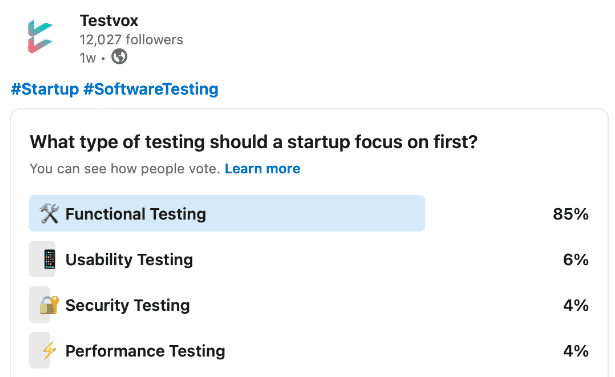
What Type of Software Testing Should a Startup Focus on First?
At Testvox, we conducted a poll involving industry experts, including senior developers, project managers, CTOs, CEOs, founders, and software test engineers. The response was overwhelming, with 85% of participants agreeing that startups should prioritize functional testing in their early stages. The consensus reflects the critical role functional testing plays in ensuring that the core features of a product work as intended before focusing on more specialized types of testing.

rioritize functional testing in their early stages. The consensus reflects the critical role functional testing plays in ensuring that the core features of a product work as intended before focusing on more specialized types of testing.
Functional testing is vital for startups as it verifies that the product aligns with user requirements and business logic, providing a strong foundation for user satisfaction. By focusing on functional testing, startups can identify and fix critical issues early, build user trust, and avoid costly post-launch problems.
Here, we consider a startup product to be built around a solid idea 💡 that aims to deliver a Minimum Viable Product (MVP) to the market. The MVP is crucial as it allows startups to present a functional version of their product to real users, who are willing to buy or invest in it. The goal is to gather feedback, validate the product concept, and iterate quickly based on user needs. Ensuring the MVP works smoothly through functional testing is essential for startups to create a positive first impression and secure early traction in the market.
What is Functional Testing?
Functional testing is focuses on verifying that an application performs according to its intended functions and requirements. It ensures that every feature and operation of the software works as expected, without any bugs or issues, by simulating user inputs and checking the outputs. The goal is to validate the system’s core functionality, including user interactions, APIs, databases, and interfaces, to ensure that the product delivers the expected results ✅
More About Functional Testing : https://testvox.com/functional-testing-service/
Advantages of Functional Testing:
- Ensures Core Functionality: Validates that the essential features of the product work as intended, crucial for an MVP or early-stage startup product.
- Detects Critical Bugs Early: Identifies key issues and defects early in development, preventing costly fixes down the line.🐞
- Improves Product Stability: Provides confidence that the product is stable, making it more reliable for early adopters and beta users.
- Enhances User Experience: Ensures that the user interface and interactions work smoothly, which is critical for gaining user trust.
- Reduces Risks: By thoroughly testing functional aspects, it minimizes the risk of crashes or system failures that could negatively impact user perception.🚨
- Supports Faster Market Launch: Helps startups quickly validate the core functionality of their product, allowing them to deliver a viable product to the market faster ⏩
- Validates Compliance with Requirements: Confirms that the product meets both business and technical requirements, ensuring alignment with user expectations.
- Facilitates Iterative Development: As startups often operate in fast-paced environments, functional testing supports quick iterations and feature updates.
- Enhances Product Scalability: Testing the product’s core features ensures that it can scale as new features are added or user demand grows.
- Boosts Investor Confidence: A well-tested product increases investor confidence by showcasing a polished, functional MVP ready for the market.
Who Should Do Functional Testing?
Experienced software test engineers who are familiar with the specific domain should lead and monitor functional testing. Their deep understanding of the domain ensures they can identify critical issues that could impact the product’s performance in real-world scenarios. However, for startups with limited resources, outsourcing functional testing to independent software testing companies can be highly beneficial. These companies are often experienced in working with startups and understand the unique challenges of rapid development cycles and MVP launches. By partnering with an independent testing firm, startups can access expert testers without the overhead of building an in-house team, ensuring thorough and efficient testing.
How Testvox Quick Auditing Helps Startups
Testvox has developed a specialized framework tailored to help startups quickly assess their product’s quality. This framework provides access to expert software test engineers who can evaluate the application and deliver actionable insights on functional issues and usability within a short turnaround time. Designed with startups in mind, it offers a cost-effective solution, enabling companies to receive professional feedback and suggestions without straining their budget. By leveraging Testvox’s quick auditing services, startups can benefit from a professional QA approach, ensuring their product meets high standards and is market-ready.
When to Do Performance Testing 🏋️♂️
Once your MVP has successfully launched in the market, it’s time to shift focus to developing the next version, which will likely include more features. At this stage, it’s essential to engage in discussions with your development and architecture teams to understand the system’s complexity and the expected load. By evaluating these factors, your team can determine the optimal timing for performance testing, typically during the second or third release. Conducting performance testing early in the development process helps identify potential bottlenecks and ensures that your application is built on a scalable architecture from the outset, positioning your startup for long-term success as user demand grows.
How to do Performance Testing : https://testvox.com/performance-testing-service/
When to Do Security Testing
As your application gains traction and builds a substantial user base, it becomes increasingly attractive to potential attackers. Therefore, conducting security testing is crucial to protect both your application and its users. It’s advisable to implement security testing during the third or fourth release, much like performance testing. By this stage, your application has typically reached a level of popularity in the market, making it essential to assess its vulnerabilities. Basic-level security testing at this point will help identify potential threats and establish a robust security framework, ensuring that your startup can maintain user trust and safeguard sensitive information as it continues to grow.
How to do Security Testing : https://testvox.com/security-testing-service/
Testvox Complete Software Testing Service
Testvox offers a comprehensive software testing service that encompasses Functional, Performance, and Security Testing in a single package. This all-inclusive approach ensures that your startup’s application is thoroughly evaluated across critical areas, providing you with the confidence needed to face the market. Our experienced team of software test engineers leverages industry best practices and advanced methodologies to identify potential issues, optimize performance, and secure your application against threats🔐With Testvox’s complete testing service, you can focus on delivering a high-quality product to your users, knowing that your application has been rigorously tested for functionality, performance, and security.









